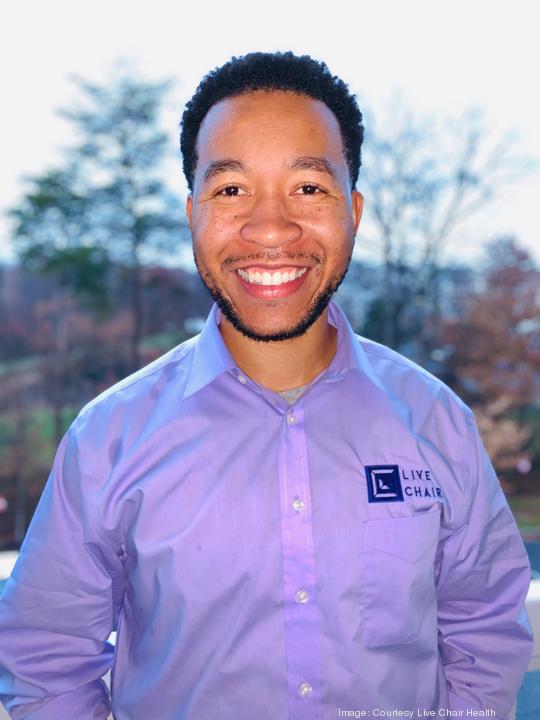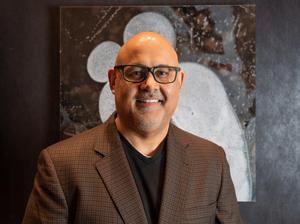
A D.C.-area startup looking to improve health outcomes for the African American community through barbershop visits has launched its first funding round.
Live Chair Health equips barbershops with tools — think infrared thermometer, blood pressure kit, information about hypertension and more — to help customers monitor and manage their health. Clients get their temperatures taken and answer some quick questions before getting their haircuts, then complete the company’s health risk assessment about conditions, medical care and insurance.
Live Chair founder Andrew Suggs recently launched a seed round to raise less than $1 million to take the company national, and is shooting to close that by the end of the first quarter with about half committed right now. Suggs also expects to raise a Series A round in the second or third quarter of this year, he said.
The genesis
Suggs launched Live Chair in D.C. as a scheduling and booking platform for Black barbershops in 2016. As he grew the business for the next few years, something going on in his personal life was weighing on him: his father's declining health.
The now-33-year-old entrepreneur started researching his father's condition, congenital heart disease, and quickly became aware of the health disparities that plague people who looked like his dad — and him.
“I realized that my dad wasn’t an anomaly, but this was common in the African American community,” Suggs said.
Then in July 2020 — four years after Andrew launched the business and amid the coronavirus pandemic — his dad, John Suggs, died from congestive heart failure, he said. “That was pretty much the last straw to pivot the business into health care.”
So he devised a way for Live Chair to take health metrics from barbershop customers and then recommend some next steps based on that data. It “allows our technology to analyze the data and then recommend the next step in the care journey,” Suggs said. That could mean connecting someone with a primary care physician for the first time or a health plan to see if they qualify for coverage, for instance.
The funding
Live Chair, now headquartered in Baltimore, plans to use the new capital to further develop its technology and bring on a marketing head and customer service representative to grow its eight-person team, which already includes a few full-time employees and a handful of contractors.
The company is also preparing to build on its existing web platform with a mobile app set to launch in January. That will allow for anyone in the U.S. to download the app, track vitals and symptoms, read content and share information with their doctors.
Then comes the larger plan to grow Live Chair’s customer base and barbershop network. That means:
- Growing the barbershop base. The startup currently operates in about 50 barbershops, mostly in Maryland; by the end of this year, that could grow to more than 200.The company pays the hair professionals to work with it, to inject dollars back into the communities it serves, Suggs said. The shops also draw new clientele through Live Chair’s advertising and promotion — a draw for them, he said.
- Tapping more health plans. Suggs says Live Chair is already working with one of the largest health insurers in the country, though he could not disclose more details at this time. That deal alone positions the startup to D.C. as well as Philadelphia, Charlotte, Atlanta and southern California this year. Under its “pay for performance” model, insurance companies would pay a per-member monthly fee based on Live Chair’s ability to identify prospective insurance plan purchasers coming through the barbershops.
- Adding health systems. Live Chair Health brought on Baltimore’s LifeBridge Health in the second half of 2020 and plans to add more such organizations going forward as clients. The business model charges health systems for access to the platform. It also gives them an opening to market their brands to communities they otherwise might have a hard time reaching, Suggs said.
The funding would come on top of about $1 million raised from some angel investors and Nashville’s Jumpstart Foundry since the scheduling and booking iteration first went live in 2016.
The backdrop
Like so many businesses, Live Chair had to adjust as the health crisis shut down barber shops for the beginning months of the Covid-19 pandemic. The startup, still pre-revenue at the time, suspended the fees for its core appointment booking service “to give the barbers who weren’t cutting a break, financially,” Suggs said.
But that's when he saw an opportunity. As it turns out, Suggs said, barbers and stylists “have the trust — if they can use a razor, they can definitely use a blood pressure cuff.” And as he tested the model, nearly all barbershop owners were on board. “That was all we needed to say, let’s make a foray into the market,” he said.
The concept isn’t new; health care initiatives at barbershops and hair salons have been around for decades. But “they haven’t become ubiquitous because programs have relied on philanthropic dollars and grant dollars, and once those dollars dry up, the program fades away,” Suggs said. “So our focus was on creating a sustainable business model so we could be remunerated and take the program across the nation.”
Suggs said he’s still figuring out the best way to position his business for an eventual exit, potentially a sale or initial public offering one day. But for now, he said, he’s focused on growing the brand and network “because we do want to become the one-stop shop for all things health care for people of color.”
It’s a demographic that experiences higher instances of conditions — hypertension, diabetes and other chronic diseases among them — that only elevate the risk of contracting or experiencing complications from Covid-19.
“Pre-Covid, we were in the business of addressing these conditions,” Suggs said, adding: “Covid only exposed what we were already at the table telling people that we need to address.”
Suggs has seen demand for Live Chair’s service surge as the pandemic has ravaged on. “I think now people are starting to take us a little bit more seriously," he said.




